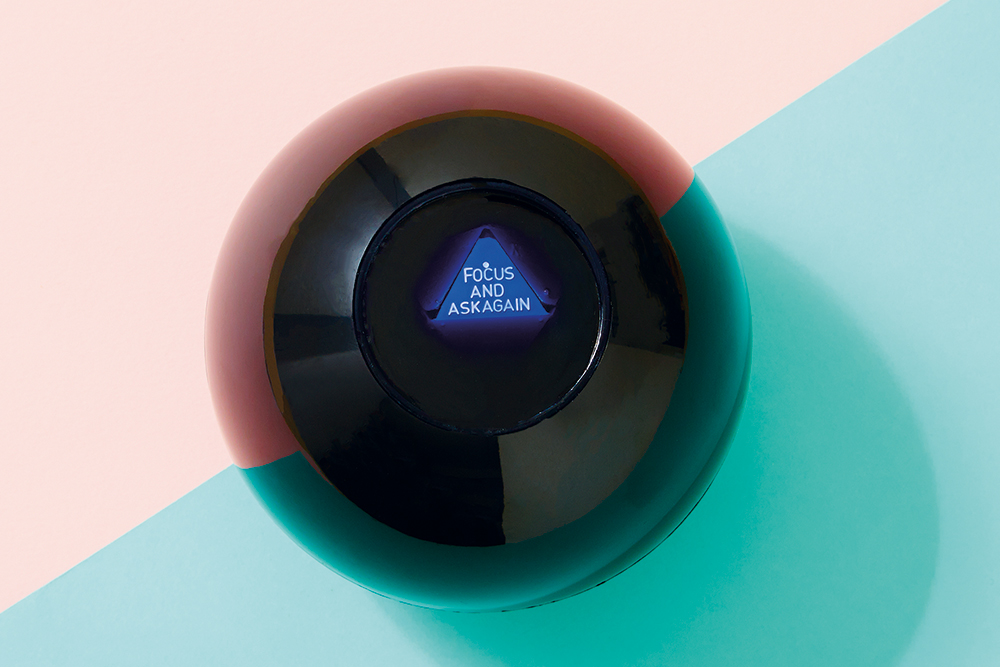What kind of decision-maker are you?
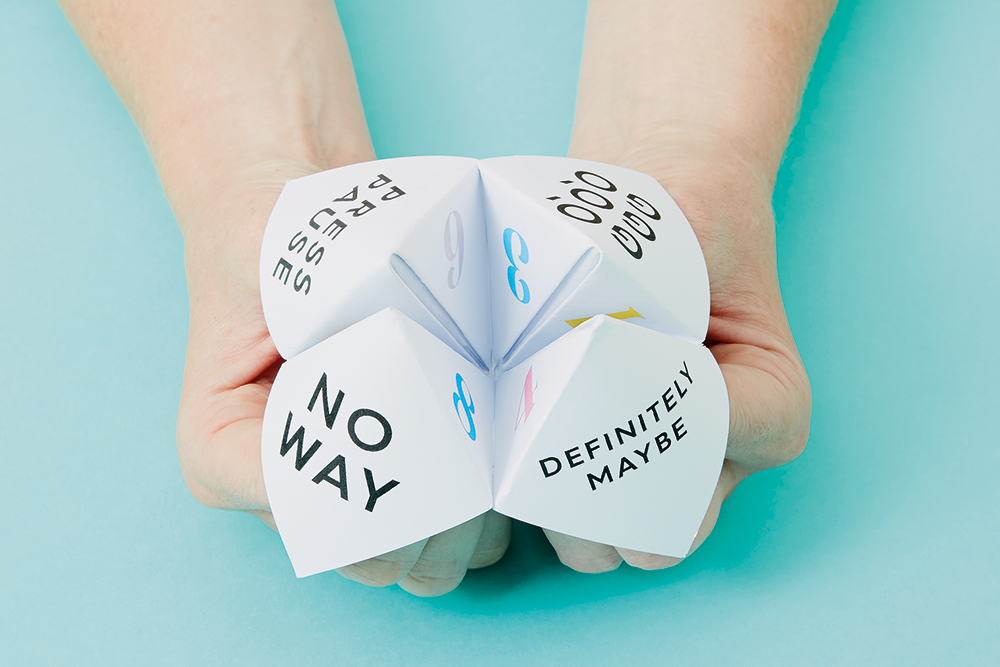
THE QUIZ
For each statement below, answer:
A – B – C
1. You’re miserable in your job. Do you…
A. Continue to lament that you ended up in a role you have to drag yourself to?
B. Hand in your resignation the moment you acknowledge that you’re unhappy?
C. Meet with your boss to talk over what could change in your position, start looking through job ads, or book a session with a careers coach?
2. You’re invited to a drinks party by someone you don’t know particularly well. Do you…
A. Wait until the day of the event to see whether you feel like attending?
B. Say yes, but then find you’re already committed to something else that night?
C. Think about whether you really want to attend the party, check your diary and reply to the host promptly?
3. You have a looming deadline at work. Do you…
A. Get a sinking feeling whenever you think about the project and procrastinate until the last possible moment, then finish it in a mad rush?
B. Complete the project in advance but then have a crisis of confidence and spend hours changing it all?
C. Create a schedule for completing the project within the time you have left?
4. You are dating someone. They have many lovely qualities but don’t meet all of your requirements for a potential life partner. Do you…
A. Continue dating, but keep an eye on other dating app profiles, meet up with that friend of a friend, and avoid any conversations about exclusivity?
B. Start mentally planning the wedding, children and move to the country?
C. Take a long, hard look at where you are and make a decision based on your values?
5. At a new restaurant, you’re faced with a menu that offers lots of desirable-sounding dishes. Do you…
A. Hold off ordering until the last moment and negotiate with your fellow diners so you can try a little of each of their dishes?
B. Glance at the menu and plump for the first thing that catches your attention?
C. Consider what choices you would be unlikely to cook at home and go for the most appetising option?
6. You need to send a birthday card this week. Do you…
A. Never even manage to buy the card, let alone send it in time?
B. Miss the last post, so call a florist and order an expensive bunch of flowers?
C. Buy a card, write a nice message and pop it in the postbox?
7. Ignoring your instincts, you follow the advice of your friends and family and make a decision that you very quickly regret. Do you…
A. Ignore all the feelings of doubt you have and continue on the chosen path.
B. Hold all those who advised you accountable for the bad decision and vow never to ignore your instincts again.
C. Accept that, though you allowed yourself to be influenced, the decision was ultimately yours and you are the only one who can get yourself out of the mess you are in.
8. You want to get a tattoo. Do you…
A. Wait and see if you end up in a tattoo parlour with a friend?
B. Wake up one morning to discover on a crazy night out you ended up getting what looks like a Chinese character tattooed on to your shoulder? And a new piercing?
C. Create a Pinterest board of designs you like and book yourself a consultation with a tattoo artist?
9. It’s the weekend and dozens of small jobs need your attention. Do you…
A. Make a list of all you need to do and then spend the rest of the day ignoring it?
B. Jump when a friend calls and suggests a diversion?
C. Choose the three most important tasks, do them and take the rest of the day off?
10. You need to buy a car. Do you…
A. Trawl eBay, visit garages, consult everyone, make test-driving cars your new weekend hobby… then defer committing?
B. Hear a friend of a friend is selling an MG Midget, get in touch and buy it unseen?
C. Work out a budget, call a friend who knows about cars and purchase something affordable and practical?
11. Things haven’t been going well in your relationship for what feels like quite a while. Do you…
A. Studiously ignore the issues, hoping that your partner might make things easier for you and call it quits first?
B. Allow the flirtations with someone at work to develop before jumping out of the old relationship and straight into a new, monogamous one?
C. Pause to explore your fears and wishes before taking any further steps?
12. You have a life-changing decision to make. Do you…
A. Feel anxious every time you remember the decision is on the horizon and turn your attention to something less taxing?
B. Figure you’re not going to feel happy with either option, so plunge head first for the option that has the edge?
C. Put time aside to think, talk to trusted friends whose views you respect, and give yourself space to make the best decision?
THE RESULTS
THE PROCRASTINATOR
You mostly answered A
You may find it easier to be decisive in some areas of your life but, at significant crossroads, you’d rather get comfy on the fence rather than commit to going right or left.
You’re in distinguished company. It’s not until the final act of his play that Hamlet finally decides to kill the uncle who murdered his father and married his mother. Hamlet’s situation is, admittedly, unusual, but nevertheless, Shakespeare shows us that to procrastinate and feel anguish when the stakes are high is part of being human.
Perhaps you feel decisions involve too much sacrifice, or you worry about making the wrong choice. Perhaps you hope circumstances will resolve an external decision.
And maybe there’s something to be said for being less active in deciding. The Chinese concept of ‘wu wei’ – or ‘non-doing’ – suggests we move with the flow of life rather than straining to make decisions.
There are times, however, when there is a need to commit to a course of action. Endless procrastination is avoidant behavior and in the long term you run the risk of never taking action or finishing projects: which illicits feelings of shame and regret.
TRY: With your next significant decision, take a peek at just what you’re trying to avoid by not facing up to it.
THE IMPULSIVE DECIDER
You mostly answered b
You make decisions on a whim and use your gut to guide you. Consciously or unconsciously, you feel that stagnancy is the worst state to be in and that any decision is better than none.
It’s likely you enjoy a higher degree of spontaneity in your life and this carefree attitude to decision-making may be paired with a willingness to face the outcomes of your decision, whatever they are.
Alternatively, you may be quick to decide but are then plagued with doubt, in common with the old proverb: marry in haste, repent at leisure.
Perhaps there’s something reflexive about the speed of your decision making. Maybe, by avoiding labouring over the alternatives, you are deliberately trying to avoid anxiety. When this nature becomes compulsive, it can be as if someone else is making your decisions for you. It’s understandable to want to avoid anxiety, but in bypassing these feelings, you can end up making decisions that are not in line with your higher wisdom.
TRY: With your next significant decision, set yourself a longer time frame to make the choice. If this feels uncomfortable, explore what is behind the discomfort.
THE INTENTIONAL PRAGMATIST
You mostly answered c
You tend to approach important decisions with your eyes wide open. Rather than leaving things to chance, you’ll engage in careful, and sometimes long, deliberation.
You’re likely to be aware that with difficult decisions, it’s hard to choose one path and commit to it, but once you’ve decided on a course of action, you find you are resolved to make the best of it.
The advantage of an active approach to decision-making is it goes hand-in-hand with acceptance of your power and resources. Rather than feeling at the mercy of circumstances outside your control, you are likely to feel that you are, to a substantial degree, the author of your own life. We live in a time in which greater emphasis than ever is placed on the ways we can take responsibility for our lives.
It would be possible to make the mistake of thinking that making difficult decisions could become easy after paying for the right book, course or coach. In fact, much effort, thoughtfulness and care is needed in order that we can move forward in our lives in a way which feels true and meaningful.
TRY: Explore the degree of spontaneity you allow in your life. Look out for an opportunity to grasp the unexpected.
WHY ARE SOME DECISIONS SO HARD TO MAKE?
In making challenging decisions, the feelings of the people closest to you often hang in the balance, as well as your own.
The existential psychotherapist and author, Irvin Yalom, suggests that it’s the process of decision making that is painful, not the content.
In opting for one path over another, you come face to face with limitation, which reminds you on some level of your mortality – something you’d rather not think about.
CREATIVE LIVING
Yalom also explains that making decisions also draws awareness to the fact that you are ultimately responsible for your own life.
Everything you decide shapes your future. In fact, even when avoiding decisions, you are making a decision – to postpone deciding!
Each choice you make plays its part in creating your life and Yalom proposes it is this ‘sole responsibility’ issue that causes anxiety.
SEEKING CONFIRMATION
People often seek to find someone else, or something else, such as a coin, to make difficult decisions for them.
In doing so, you may miss the opportunity to explore the deeper implications of what you are facing, and to face up to your hidden fears.
FIND YOUR BALANCE
When next faced with a difficult decision you might like to…
1. Get in touch with your feelings and pinpoint what you are wishing for. If you can’t locate your feelings about an issue, use fantasy to allow you to find greater clarity. Imagine the different paths you might take and then note what emotions these fantasies provoke.
2. Explore the fears which each option holds. Hold each fear up to the light and ask how far it is removed from reality.
3. Consider the benefits of each option. Try to be as exhaustive and honest as you possibly can.
4. Reframe the decision to help keep things in perspective, as sometimes we distort the significance of a decision in our minds. You might, for example, imagine what you would feel about this particular question if you were at the end of your life, looking back.
5. Find out whether you can rearrange the options you’ve given yourself so you have less to lose.
6. Acknowledge that the really big, life-changing decisions usually require time. Sometimes it really does help to sleep on it!
Decisions, Decisions…
Balance asked Londoners about making their minds up – do they find it easy? And what’s the best decision they ever made?

Pascape Salvatore, 22, Italy, student, says, ‘The best decision I ever made was quitting business school. It was not my thing, now I am a tailor. I feel it in my stomach when something isn’t right.’
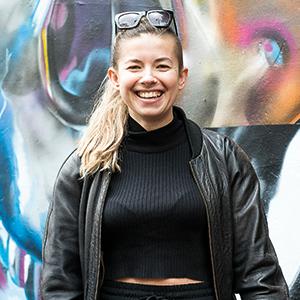
Ania Placzkiewilz, 32, London, writer, says, ‘Sometimes it can be confusing whether the decision is intuition or fear. Sometimes you can clearly hear it’s intuition, but I’m still learning to tell the difference.’
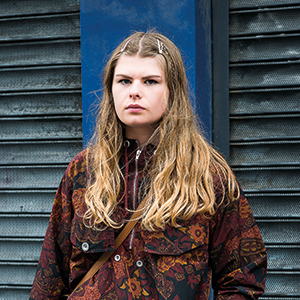
Scarlet Griffiths, 17, London, student, says, ‘It takes me about 20 minutes to decide even little things, like what sandwich filling I want.’

Jose Ruigomez, 40, California, chef, says, ‘Moving to London when I was 20 years old was the best decision I’ve made in my life. I grew up in Mexico City. I sold my car and bought the first plane ticket leaving to Europe – it brought me over here.’
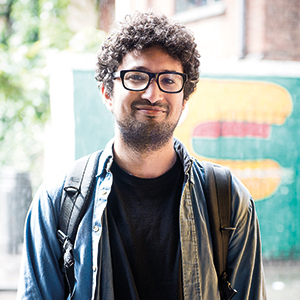
Michael-Jon Mizra, 25, Stratford, musician, says, ‘I try to break cycles that I think will be detrimental to me moving forward, especially with things that scare me. I’ll think, “I wouldn’t normally do this, but I want to do this, so I’m going to do it!”’
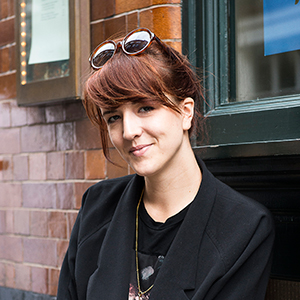
Elisa Fargeas, 25, London, sommelier, says, ‘The best decision I ever made was to take my backpack and travel the world. It was a super-easy decision to make, but it was quite impulsive.’

Aurelie Vancoppenolle, 31, London, restaurant manager, says, ‘I came here with my ex-boyfriend, but the city makes you be who you really are, and I wasn’t meant to be with him so he left. I work in hospitality so I have to be impulsive and make decisions really fast. I always follow my intuition.’



